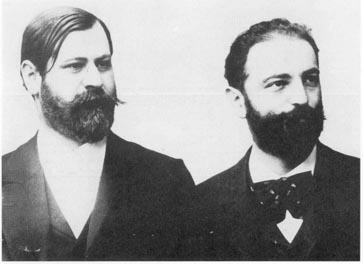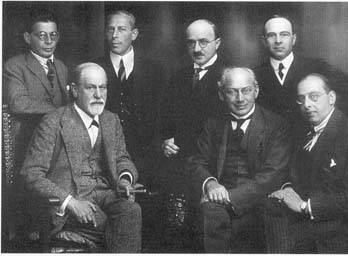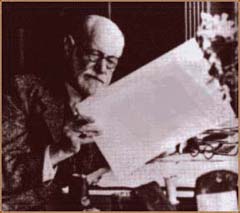Sigmund Freud
 Sigmund Freud was born in Freiberg in what is now the Czech Republic on May 6th, 1856. When he was very young his family
settled in Vienna, where Freud remained for most of his life. Fredu entered university in 1873, did neurological research and left in 1883 to intern at Vienna General Hospital as
he required a higher salary so he could get married. As he believed that masturbation and "coitus interruptus" caused neuroses he was understandably anxious to marry.
During these years he first gained attention with his "researches" on cocaine with which he was very impressed. He was so desperate for fame and fortune and using so regularly
that he published false results of morphine dependancy being cured with the use of cocaine. His unfortunate friend to whom he prescribed this therapy committed suicide, a double
addict. In 1886, Freud established a private practice specialising in nervous diseases. Many of Freud's early patients were "hysterics" with bizarre and pronounced symptoms that
are no longer encountered today. The reason for the disappearance of such patients over the last century has never been determined.
Sigmund Freud was born in Freiberg in what is now the Czech Republic on May 6th, 1856. When he was very young his family
settled in Vienna, where Freud remained for most of his life. Fredu entered university in 1873, did neurological research and left in 1883 to intern at Vienna General Hospital as
he required a higher salary so he could get married. As he believed that masturbation and "coitus interruptus" caused neuroses he was understandably anxious to marry.
During these years he first gained attention with his "researches" on cocaine with which he was very impressed. He was so desperate for fame and fortune and using so regularly
that he published false results of morphine dependancy being cured with the use of cocaine. His unfortunate friend to whom he prescribed this therapy committed suicide, a double
addict. In 1886, Freud established a private practice specialising in nervous diseases. Many of Freud's early patients were "hysterics" with bizarre and pronounced symptoms that
are no longer encountered today. The reason for the disappearance of such patients over the last century has never been determined.
Freud originally claimed that all hysteria was caused by paedophilia and incestuous abuse. This naturally caused controversy amongst Viennese doctors but Freud eventually realized that as he and some of his siblings were at least partly neurotic then this would implicate his own father. As he could not remember such abuse (this was before "repressed memory" techniques) he decided that most of these patients were relating fantasies of childhood sexuality.
 He elaborated the basic principles of psychoanalysis over a period of about six years (1894 to 1899) while deeply involved
in an intimate friendship with Wilhelm Fliess - a German nasal surgeon who had invented a theory of "nasal reflexes" whereby all human problems, especially sexual, were directly
related to areas of nasal membranes and could be cured by operations on the nose of which Freud had several and numerous applications of cocaine. Fliess had also elaborated a
theory of bio-rhythms in men & women that eventually became so complex only he could understand it. Eventually he broke with Freud over claims of plagiarism and became
paranoid believing Freud was trying to kill him.
He elaborated the basic principles of psychoanalysis over a period of about six years (1894 to 1899) while deeply involved
in an intimate friendship with Wilhelm Fliess - a German nasal surgeon who had invented a theory of "nasal reflexes" whereby all human problems, especially sexual, were directly
related to areas of nasal membranes and could be cured by operations on the nose of which Freud had several and numerous applications of cocaine. Fliess had also elaborated a
theory of bio-rhythms in men & women that eventually became so complex only he could understand it. Eventually he broke with Freud over claims of plagiarism and became
paranoid believing Freud was trying to kill him.
Freud had a young patient, Emma Eckstein, on whom Fliess operated after which she began to haemorrhage. Fliess had returned to Berlin and finally Freud had to call in another surgeon who found Fliess had left ½ metre of gauze in her nasal cavity. Ms Eckstein recovered but was disfigured by the loss of bone in her nose. Initially Freud exonerated Fliess of any blame as it was a mistake that any cocaine sniffing surgeon would make but a year later he had apparently forgotten the physical horror he felt when the rotting gauze had been removed and the patient nearly died of blood loss and decided it had all been "hysterical" bleeding on the part of the patient.
During the years he was elaborating his theories through self-analysis (not by examination of his patient's histories) he suffered from a recurrent cardiac arrhythmia, shortness of breath, and disturbing doubts alternating with the conviction that he was on the brink of making great discoveries - any Hollywood psychiatrist would recognise these symptoms. Research has shown that his early published case histories were untruthfully reported as cures.
 Freud was a materialist and believed psychoanalysis was a science, but very few of its hypotheses can be
scientifically proven or disproven. From the beginning of Freud's publication of his work, critics immediately demanded case notes, controls, publication of psychoanalytic
techniques, etc but these were not forthcoming. Freud stated that psychoanalysis was the only way of validating psychoanalysis and it almost immediately became a secular religious
movement, outwardly claiming to be non-religious but organising and acting as a cult, even creating its own inquisition (picture right). Members had to agree
on the primacy of the sexual basis of neurosis and to defer to Freud in all theoretical formulations else Freud became personally hostile and accused them of being mentally ill.
Disagreements became doctrinal disputes within a Church rather than disagreement that could be settled by scientific investigation and experiment.
Freud was a materialist and believed psychoanalysis was a science, but very few of its hypotheses can be
scientifically proven or disproven. From the beginning of Freud's publication of his work, critics immediately demanded case notes, controls, publication of psychoanalytic
techniques, etc but these were not forthcoming. Freud stated that psychoanalysis was the only way of validating psychoanalysis and it almost immediately became a secular religious
movement, outwardly claiming to be non-religious but organising and acting as a cult, even creating its own inquisition (picture right). Members had to agree
on the primacy of the sexual basis of neurosis and to defer to Freud in all theoretical formulations else Freud became personally hostile and accused them of being mentally ill.
Disagreements became doctrinal disputes within a Church rather than disagreement that could be settled by scientific investigation and experiment.
 Freud's original aim was to establish psychoanalysis as a method of treatment comparable with the medical treatment of
disease despite the fact that he knew it was useless for psychotics, schizophrenics and uneducated workers. Only the wealthy worried well were able to be helped and only they were
able to afford analysis anyway. He believed if a patient could be helped to overcome the blocks imposed by repression, and recall his or her earliest infantile sexual impulses,
these could be brought into consciousness and "abreacted", then neurosis would disappear and mature sexual satisfaction be enjoyed.
Freud's original aim was to establish psychoanalysis as a method of treatment comparable with the medical treatment of
disease despite the fact that he knew it was useless for psychotics, schizophrenics and uneducated workers. Only the wealthy worried well were able to be helped and only they were
able to afford analysis anyway. He believed if a patient could be helped to overcome the blocks imposed by repression, and recall his or her earliest infantile sexual impulses,
these could be brought into consciousness and "abreacted", then neurosis would disappear and mature sexual satisfaction be enjoyed.
Why was psychoanalysis so successful in spreading its concepts throughout society? Firstly because although Freud hadn't invented the concept of the unconscious he stressed it and the importance of sexuality at a time when sexuality could not be discussed in polite society. His technique of calmly listening to the patient "free-associate" and his tolerance were very helpful for people who were disturbed and unhappy and analysis gave hope. Psychoanalysis offered membership of an elite circle claiming superior knowledge and status. Those who questioned psychoanalytic theory or practice were said to be insufficiently analysed or showing 'resistance'. That is, if an opponent said that Freud's insistence on sexuality was overstated then Freudians retorted that this showed that the person had unresolved sexual difficulties.
Freud left Austria after the Nazi takeover in 1938. He was obliged to pay a substantial sum before he could leave for England and to sign a statement that the Gestapo had not mistreated him. After signing he heroically added a complimentary sentence assuring all that he could heartily recommend the Gestapo to anyone. Unfortunately he was unable to examine his own career and teachings with this same ironic clear sightedness. He died in London on September 23, 1939. While sometimes a cigar is just a cigar, too many cigars can be fatal.
In the past 20 years Freudianism has had a marked fall in support and it is estimated that there are only 20,000 patients still involved in Freudian psychoanalysis in the USA, Woody Allen is one of them.
Freudians have numerous Internet sites including Sigmund Freud Net.
I am not aware of any organised anti-Freudian internet sites though in the last 20 years numerous authors have published many damning books about Freud and freudianism. Apart from the books cited below the main authors include Frederick Crewe, Peter Swales and Adolf Grunbaum.
- Feet of Clay - A Study of Gurus
by Anthony Storr
An interesting, sympathetic examination of the concept of guruship from a modern neo-Freudian analyst and author.
Introduction
Chapter on Freud - Dr Freud - A Life
Paul Ferris
A good introduction, reasonably concise. - Why Freud Was Wrong
Richard Webster
A longer treatment with much interesting background information and historical context.  The Freudian Fallacy
The Freudian Fallacy
by E.M. Thornton
This book makes the claims that Freud's central postulate, the unconscious mind, does not exist; that his theories were based on pathological phenomena; and that Freud himself, when formulating these theories, was under the influence of a highly toxic drug famous for its effects of inducing grandiosity and fantasies - cocaine. Thornton substantiates her claims with the use of case histories, current medical knowledge and letters written by Freud to Wilhelm Fliess, his closest friend during the last decade of the nineteenth century the period of time when he was formulating the ideas that are the basis of psychoanalysis. Gleaned from this correspondence - which had been impounded by the Freud family - is evidence of the influence of cocaine upon Freud's personality and theories. Through the examination of the cases upon which Freud based his work, we see that his fundamental assumptions were grounded in fallacies and reports of favorable results achieved in the treatment of hysterics were deliberate lies.- The Assault on Truth : Freud's Suppression of the Seduction Theory
Jeffrey Moussaieff Masson - The Complete Letters of Sigmund Freud to Wilhelm Fliess, 1887-1904
Jeffrey Masson (Editor) - Against Therapy
Jeffrey Moussaieff Masson